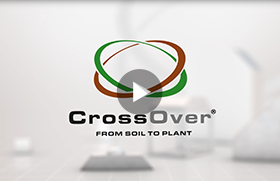Sustainable turf management with CrossOver's soluble silicon
Golf course superintendents and professional turf managers for decades have used calcium, gypsum and limestone products to adjust pH, replenish calcium and overcome problems associated with acidic or sodic soils with varying degrees of success. These approaches often fail to provide a longer-term solution to soil stabilization and absorption of soluble sodium by turfgrass.
CrossOver functions as a highly efficient and effective amendment and when compared to calcium, gypsum and limestone products, offers a significantly better and more comprehensive set of geochemical solutions. Silicon corrects chemical imbalances, nutrient deficiencies, structural instability and ion toxicity issues associated with low pH, salt-affected and high pH sodic soils.
When CrossOver is applied to the soil, the formulated prills dissolve and release plant-available silicon, calcium and magnesium. As silicon is absorbed by the plant, it crosses over from its role as a soil amendment and stimulates the plant’s natural defense systems, increasing resistance to salt, disease, and biotic and environmental stresses.
Abiotic and biotic stresses
From uncooperative weather to fungal attacks on fairways and greens, turfgrass needs to hold up to a number of stresses. Silicon plays an active role in plant processes that enhance and improve the efficiency and effectiveness of defense response systems under environmental stress conditions and biological attack.
Stress responses improved by CrossOver’s silicon include:
- Alleviation of salt stress
- Reduction of drought stress and heat stress
- Promotion of balanced nutrient availability and transport
- Improvement in plant structural integrity
- Increased photosynthetic activity
Soil modification
CrossOver’s calcium satisfies best practices for calcium nutrient requirements and to initiate soil modification via calcium substitution for sodium and other cations present on the surface of soil particles. Soil surface mineralogy is enhanced via particle flocculation and agglomeration altered by calcium cations.
Soil stabilization
The silicon in CrossOver goes beyond the effects of calcium cations, adding a new dimension to soil stabilization.
Enhanced soil stabilization occurs in salt-affected soils when calcium and silicate ions released from CrossOver react with each other under high pH and form geopolymers of calcium silicate hydrate. In acid soils, silicate ions and aluminum hydroxide react under low pH to form geopolymers of hydroxyaluminosilicate.
These hydrated gels bind the soil particles together to form insoluble calcium silicates and establish starting points for enhanced soil particle flocculation and inter-particle crystal matrix formation.
Calcium cations help promote flocculation, but the combination of silicon-based geopolymers and calcium form a much stronger attraction between solid particles than calcium alone. Further, compared to calcium alone, CSH (high pH) or HAS (acidic conditions) in combination with cationic calcium is far less susceptible to reversal should salt or acidic conditions return.


